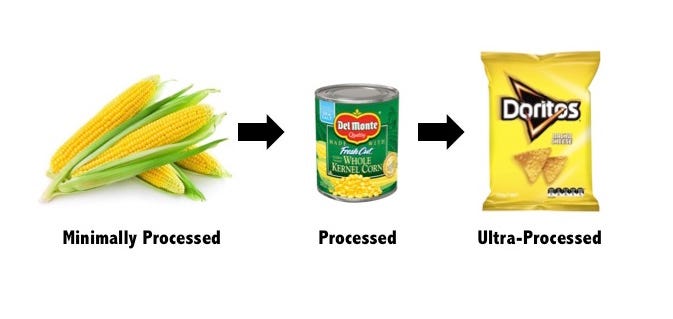The Link Between Highly Processed Foods and Brain Health
Eating packaged foods like cereal and frozen meals has been associated with anxiety, depression and cognitive decline.
In the 21st century, highly processed foods have become part of most people’s eating habits. According to a study published in The BMJ, ultra-processed foods are the main source (nearly 58%) of calories eaten in the US, and contribute almost 90% of the energy we get from added sugars.
Roughly 60 percent of the calories in the average American diet come from highly processed foods. We’ve known for decades that eating such packaged products — like some breakfast cereals, snack bars, frozen meals and virtually all packaged sweets, among many other things — is linked to unwelcome health outcomes, like an increased risk of diabetes, obesity and even cancer. But more recent studies point to another major downside to these often delicious, always convenient foods: They appear to have a significant impact on our minds, too.
Research from the past ten or so years has shown that the more ultraprocessed foods a person eats, the higher the chances that they feel depressed and anxious. A few studies have suggested a link between eating UPFs and increased risk of cognitive decline.
What qualifies as an ultraprocessed food?
In 2009, Brazilian researchers put food on a four-part scale, from unprocessed and minimally processed (like fruits, vegetables, rice and flour) to processed (oils, butter, sugar, dairy products, some canned foods, and smoked meats and fish) and ultraprocessed. “Ultraprocessed foods include ingredients that are rarely used in homemade recipes — such as high-fructose corn syrup, hydrogenated oils, protein isolates and chemical additives” like colors, artificial flavors, sweeteners, emulsifiers and preservatives, said Eurídice Martínez Steele, a researcher in food processing at University of Sao Paulo, Brazil. This classification system is now used widely by nutrition researchers.
UPFs make up a majority of the packaged foods you find in the frozen food aisles at grocery stores and on the menu at fast-food restaurants — 70 percent of the packaged foods sold in the United States are considered ultraprocessed. They’re increasingly edging out healthier foods in people’s diets and are widely consumed across socioeconomic groups.
“Ultraprocessed foods are carefully formulated to be so palatable and satisfying that they’re almost addictive,” said Dr. Eric M. Hecht, an epidemiologist at the Schmidt College of Medicine at Florida Atlantic University. “The problem is that in order to make the products taste better and better, manufacturers make them less and less like real food.”
What effect do ultraprocessed foods have on mental health?
Recent research has demonstrated a link between highly processed foods and low mood. In one 2022 study of over 10,000 adults in the United States, the more UPFs participants ate, the more likely they were to report mild depression or feelings of anxiety.
New research has also found a connection between high UPF consumption and cognitive decline. A 2022 study that followed nearly 11,000 Brazilian adults over a decade found a correlation between eating ultraprocessed foods and worse cognitive function (the ability to learn, remember, reason and solve problems). “While we have a natural decline in these abilities with age, we saw that this decline accelerated by 28 percent in people who consume more than 20 percent of their calories from UPFs,” said Natalia Gomes Goncalves, a postdoctoral researcher at the University of São Paulo Medical School and the lead author of the study.
William Wilson, author of “The Brain Drain” states that foods high in sugar, trans fats, and artificial ingredients cause inflammation in the body and the brain which can increase one’s risk of dementia and Alzheimer’s disease. Furthermore, Processed foods reduce the production of a brain-derived molecule called neurotrophic factor which is responsible for long-term memory, learning, and the growth of new brain cells.
Mayer Emeran, author of “The Mind-Gut Connection” explains that serotonin is a neurotransmitter that helps regulate sleep and appetite, mediate moods, and inhibit pain. Since about 95% of one’s serotonin is produced in one’s gastrointestinal tract, and one’s gastrointestinal tract is lined with a hundred million neurons, it makes sense that the inner workings of one’s digestive system do not just help one’s digest food, but also guide one’s emotions. The function of these neurons and the production of neurotransmitters like serotonin is highly influenced by the billions of "good" bacteria that make up one’s intestinal microbiome.
Why might ultraprocessed foods have this effect?
Much of the research has focused on how poor gut health might affect the brain. Diets that are high in ultraprocessed foods are typically low in fiber, which is mostly found in plant-based foods like whole grains, fruits, vegetables, nuts and seeds. Fiber helps feed the good bacteria in the gut. Fiber is also necessary for the production of short-chain fatty acids, the substances produced when it breaks down in the digestive system, and which play an important role in brain function, said Wolfgang Marx, the president of the International Society for Nutritional Psychiatry Research and a senior research fellow at Deakin University. “We know that people with depression and other mental disorders have a less diverse composition of gut bacteria and fewer short-chain fatty acids.”
Poor gut microbiota diversity — as well as a diet high in sugar — may contribute to chronic inflammation, which has been linked to a host of mental and physical issues, Dr. Lane said. “Interactions between increased inflammation and the brain are thought to drive the development of depression,” she said.
It’s also worth considering the possibility that the link between highly processed foods and mental health works in both directions. “Diet does influence mood, but the reverse is also true,” said Dr. Frank Hu, a professor of nutrition and epidemiology at the Harvard T.H. Chan School of Public Health. “When you get stressed, anxious or depressed, you tend to eat more unhealthy foods, in particular ultraprocessed foods that are high in sugar, fat and chemical additives.”
How to recognize ultraprocessed foods
The best way to identify ultraprocessed foods is to read product labels. “A long list of ingredients, and especially one that includes ingredients you would never use in home cooking,” are clues that the food is ultraprocessed.
You can still use convenience foods to make cooking easier without resorting to ultraprocessed foods. Products such as canned beans, frozen vegetables, precooked brown rice or canned fish are all shortcut ingredients that fit well within the scope of a healthy diet, provided there aren’t any industrial items on the ingredient list. “If the added ingredients are ones you would use yourself, like herbs, spices, salt or cooking oils,” Dr. Linsenmeyer said, “that’s an indication that the food, while processed, is not inherently bad for you.”
Resources
Lusting, Robert H. Metabolical: The Lure and the Lies of Processed Food, Nutrition, and Modern Medicine. Harper Wave, 2021.
Mayer, Emeran. The Mind-Gut Connection: How the Hidden Conversation Within Our Bodies Impacts Our Mood, Our Choices, and Our Overall Health. Harper Wave, 2018.
Wilson, William L. Brain Drain: How Highly Processed Food Depletes Your Brain of Neurotransmitters, the Key Chemicals It Needs to Properly Function. Carb Syndrome, Inc., 2019.
McManus, K. D. (2020, January 9). What are ultra-processed foods and are they bad for our health?. Harvard Health. https://www.health.harvard.edu/blog/what-are-ultra-processed-foods-and-are-they-bad-for-our-health-2020010918605
Wadyka, S. (2023, May 4). The link between highly processed foods and Brain Health. The New York Times. https://www.nytimes.com/2023/05/04/well/eat/ultraprocessed-food-mental-health.html






